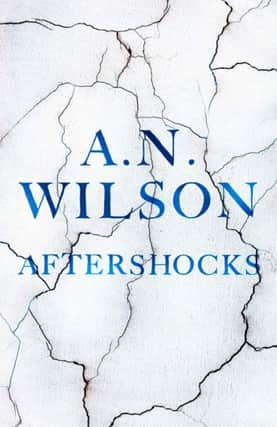Book review: Aftershocks, by AN Wilson


Aftershocks probably won’t alter this, though it should, for it’s unlikely that a more intelligent, amusing and yet disturbing novel will appear this autumn. It is wonderfully readable, and readability is something that stern critics often disdain. It addresses important questions, but it does so in a light tone of voice. One of Wilson’s many merits is that he is serious without being solemn.
The setting is an imaginary island, known only as The Island, lying somewhere in the South Pacific. It was a British colony, actually a very English one even though the action takes place in a city called Aberdeen (named after the Victorian prime minister, not the Granite City, from which, however, he took his title.) The Island is mixed-race and very beautiful, richly created and peopled by Wilson. Religiously it has been dominated by the Church of England or the Anglican Community; the Bishop and the Dean of the Cathedral are both women.
Advertisement
Hide AdThe narrator, for much of the novel, is a young actress, Ingrid. We soon learn that she is in love with another woman but we are not sure for some time whether this is the Dean (Eleanor) or the Dean’s alter ego, Digby, an academic teaching a course on Greek tragedy. The confusion (which exists in the mind of the reader, rather than Ingrid) will be resolved in the aftershock of the earthquake which destroys most of Aberdeen’s Victorian city. Readers will identify Wilson’s Aberdeen with Christchurch, but though a visit to that devastated city “planted the seed of this novel” in his mind, his Island and his Aberdeen are, like almost all the characters, invented.
The Island and the descriptions of Aberdeen before the earthquake are as delightful as the account of the quake itself is horribly convincing. However, charming as Wilson’s invention is there is a serious argument at the heart of the novel. It’s an argument inevitably provoked by natural as well as man-made disasters, and it is what Muriel Spark called “The Only Problem,” the perplexity explored in the Book of Job: how do you reconcile the idea of an all-loving all-powerful God with the reality of pain, suffering, evil and destruction?
Wilson dramatises this effectively – more effectively perhaps than Spark in that novel, by giving us the Janus-faced figure of Eleanor the Anglican Dean and Digby the student of Greek tragedy. The gods and goddesses of the Greek Olympus are either hostile to men and women or indifferent to their fate. Were the Greeks nearer to the truth than the Christian churches have been? The argument is of course never capable of being brought to a satisfactory conclusion. What matters is that it should be elaborated, its implications explored and ultimately accepted.
The philosophical argument is central to the novel, but the novel’s delightful vitality depends on the fecundity of Wilson’s invention, the richness of his depiction of people and place, the ease and virtuosity of his prose, and the generosity of his temper. One might criticise its structure, for it shifts from Ingrid’s voice to an omniscient third-person nameless narrator whenever it’s convenient to do so, but I doubt if many readers will find this easy switching weakens the novel as a coherent work of art as novelists as serious as Henry James, Joseph Conrad and Ford Madox Ford would have insisted it must. Wilson is indifferent to such theories and Aftershocks is very good indeed.
Aftershocks, by AN Wilson, Atlantic Books, 273pp, £16.99